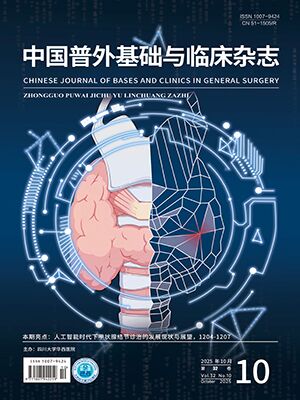| 1. |
Allemani C, Matsuda T, Di Carlo V, et al. Global surveillance of trends in cancer survival 2000-14 (CONCORD-3): analysis of individual records for 37 513 025 patients diagnosed with one of 18 cancers from 322 population-based registries in 71 countries. Lancet, 2018, 391(10125): 1023-1075.
|
| 2. |
Yang JD, Hainaut P, Gores GJ, et al. A global view of hepatocellular carcinoma: trends, risk, prevention and management. Nat Rev Gastroenterol Hepatol, 2019, 16(10): 589-604.
|
| 3. |
Tokumitsu Y, Sakamoto K, Tokuhisa Y, et al. A new prognostic model for hepatocellular carcinoma recurrence after curative hepatectomy. Oncol Lett, 2018, 15(4): 4411-4422.
|
| 4. |
Matsumoto T, Kubota K, Aoki T, et al. Clinical impact of anatomical liver resection for hepatocellular carcinoma with pathologically proven portal vein invasion. World J Surg, 2016, 40(2): 402-411.
|
| 5. |
张小晶, 王琳. 微血管侵犯在肝癌综合诊断与治疗中的临床意义. 中华消化外科杂志, 2019, 18(4): 336-341.
|
| 6. |
Pirkmajer S, Chibalin AV. Hormonal regulation of Na+-K+-ATPase from the evolutionary perspective. Curr Top Membr, 2019, 83: 315-351.
|
| 7. |
Shiina N, Yamaguchi K, Tokunaga M. RNG105 deficiency impairs the dendritic localization of mRNAs for Na+/K+ ATPase subunit isoforms and leads to the degeneration of neuronal networks. J Neurosci, 2010, 30(38): 12816-12830.
|
| 8. |
Biesemann C, Grønborg M, Luquet E, et al. Proteomic screening of glutamatergic mouse brain synaptosomes isolated by fluorescence activated sorting. EMBO J, 2014, 33(2): 157-170.
|
| 9. |
Wu M, Yuan H, Li X, et al. Identification of a five-gene signature and establishment of a prognostic nomogram to predict progression-free interval of papillary thyroid carcinoma. Front Endocrinol (Lausanne), 2019, 10: 790.
|
| 10. |
Lubecka K, Flower K, Beetch M, et al. Loci-specific differences in blood DNA methylation in HBV-negative populations at risk for hepatocellular carcinoma development. Epigenetics, 2018, 13(6): 605-626.
|
| 11. |
李征, 何剪太. FXYD6 蛋白在鼻咽癌组织中的表达. 中国耳鼻咽喉颅底外科杂志, 2011, 17(4): 252-254, 258.
|
| 12. |
Liu J, Zhou N, Zhang X. A monoclonal antibody against human FXYD6. Hybridoma (Larchmt), 2011, 30(5): 487-490.
|
| 13. |
Chen X, Sun M, Hu Y, et al. FXYD6 is a new biomarker of cholangiocarcinoma. Oncol Lett, 2014, 7(2): 393-398.
|
| 14. |
陈雄飞, 周宁新, 张红红. FXYD6 在肝门胆管癌中的表达及临床意义. 中国普外基础与临床杂志, 2016, 23(11): 1344-1347.
|
| 15. |
Gao Q, Chen X, Duan H, et al. FXYD6: a novel therapeutic target toward hepatocellular carcinoma. Protein Cell, 2014, 5(7): 532-543.
|
| 16. |
陈雄飞, 张执全, 袁俊建, 等. hFXYD6 真核表达载体构建及对人肝癌细胞系 SMMC7721 细胞的生物学作用的影响. 生物医学工程与临床, 2017, 21(6): 660-663, 671.
|
| 17. |
Li ZM, Zhang HY, Wang YX, et al. MicroRNA-137 is downregulated in human osteosarcoma and regulates cell proliferation and migration through targeting FXYD6. J Drug Target, 2016, 24(2): 102-110.
|
| 18. |
Xu SY, Xu PF, Gao TT. MiR-372-3p inhibits the growth and metastasis of osteosarcoma cells by targeting FXYD6. Eur Rev Med Pharmacol Sci, 2018, 22(1): 62-69.
|
| 19. |
陆录, 钦伦秀. 美国癌症联合委员会肝癌分期系统 (第 8 版) 更新解读. 中国实用外科杂志, 2017, 37(2): 141-145.
|
| 20. |
中华人民共和国国家卫生健康委员会医政医管局. 原发性肝癌诊疗规范 (2019 年版). 中华消化外科杂志, 2020, 19(1): 1-20.
|
| 21. |
陈雄飞, 袁俊建, 张执全, 等. 抗人 FXYD6 特异性多肽单克隆功能性抗体制备及生物学作用鉴定. 重庆医学, 2018, 47(10): 1309-1313.
|
| 22. |
Croagh CM, Lubel JS. Natural history of chronic hepatitis B: phases in a complex relationship. World J Gastroenterol, 2014, 20(30): 10395-10404.
|
| 23. |
Sayiner M, Golabi P, Younossi ZM. Disease burden of hepatocellular carcinoma: a global perspective. Dig Dis Sci, 2019, 64(4): 910-917.
|
| 24. |
Zhang X, Li J, Shen F, et al. Significance of presence of microvascular invasion in specimens obtained after surgical treatment of hepatocellular carcinoma. J Gastroenterol Hepatol, 2018, 33(2): 347-354.
|
| 25. |
Nitta H, Allard MA, Sebagh M, et al. Predictive model for microvascular invasion of hepatocellular carcinoma among candidates for either hepatic resection or liver transplantation. Surgery, 2019, 165(6): 1168-1175.
|
| 26. |
Erstad DJ, Tanabe KK. Prognostic and therapeutic implications of microvascular invasion in hepatocellular carcinoma. Ann Surg Oncol, 2019, 26(5): 1474-1493.
|
| 27. |
Lu X, Pan J, Li S, et al. Establishment of a predictive genetic model for estimating chemotherapy sensitivity of colorectal cancer with synchronous liver metastasis. Cancer Biother Radiopharm, 2013, 28(7): 552-558.
|
| 28. |
Shimada S, Kamiyama T, Yokoo H, et al. Clinicopathological characteristics of hepatocellular carcinoma with microscopic portal venous invasion and the role of anatomical liver resection in these cases. World J Surg, 2017, 41(8): 2087-2094.
|
| 29. |
马立峰, 郭艾, 于浩淼, 等. 钠钾 ATP 酶 α 亚基表达和细胞生长相关性的研究进展. 中华损伤与修复杂志 (电子版), 2013, 8(6): 68-71.
|
| 30. |
王纪传, 戴英增, 王婷婷. 表皮生长因子、雄激素受体和表皮生长因子受体在肝癌组织中的表达及影响因素分析. 癌症进展, 2020, 18(5): 505-508.
|
| 31. |
张东梅, 卿晨. 血管内皮生长因子家族及其受体与肿瘤血管新生. 医学综述, 2017, 23(3): 417-420, 427.
|




